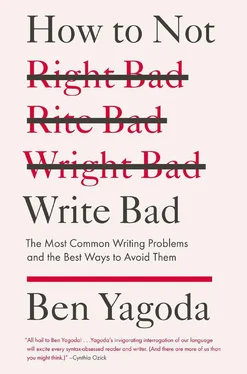How much reading will do the trick? The writer Malcolm Gladwell has popularized the notion that, in order to become an outstanding practitioner in any discipline, you need to devote to it roughly 10,000 hours of practice. I’ll accept that in terms of reading. If you put in two hours a day, that works out to about thirteen and a half years. If you start when you’re eight, you’ll be done by college graduation!
The specific benefits of widespread reading are many. Certainly, it’s the very best and most painless way to absorb the rules of the language. It’s similar to table manners or conduct in public or any other social protocol — it’s far more effective to learn by observing than by studying a textbook or being drilled in a classroom.
Prominent among the protocols of written language is spelling. And please, spare me the retort that spell-check programs mean we don’t have to know how to spell anymore. No question, these applications can be helpful. If I happen to be writing about unfortunate digestive conditions, I can put down diarrea and then diarhea and finally diarrhea —getting a frisson of pleasure from seeing the last one absent a squiggly red line. But spell-check is anything but a cure-all and actually can make things worse. That is, it puts no red line under words that are correctly spelled, but are totally the wrong word. And thus the writer gets a false sense of security and hits save or send or print. This has produced a whole consortium of understandable errors like he lead the way (instead of led ); pouring over a book (instead of poring ); or peaking his interest ( piquing ), all of which will probably become the standard spelling some decades hence. (Just as the correct U.S. spelling changed years ago from neighbour and colour to the u -less versions.) More troubling are very common mistakes like confusing your and you’re, its and it’s , and there and their. And worst of all are the howlers that result when spell-check’s suggestions are blindly taken. As I described in more detail in entry II.I.C.2., I have had students refer to wearing a sequence-covered dress , to the Super Attendant of Schools , to a heroine attic , and to an athlete who had to miss several weeks of the season because of phenomena , which baffled me till I realized it was supposed to be pneumonia.
Then there’s punctuation, which once again, you learn far more thoroughly by reading widely than by studying. Not having read widely, most young writers today don’t have a clue. Or, rather, they haven’t mastered the rules, so are guided by intuition and/or sound, which are sometimes helpful but more often aren’t. The intuition leads to the currently hugely popular “logical punctuation”, which I have just used — it consists of putting periods and commas outside quotation marks, when the situation seems to call for it. This style has long been standard practice in the United Kingdom and various outposts of the British Empire, but not the United States. However, in the last five years or so, it’s become inescapable on the Web — and in my classroom, despite repeated sardonic remarks from me that we are in Delaware, not Liverpool. On the logic that while this might be logical, and might become established sometime in the future, it is wrong now, I’ve begun to announce and enforce a one-point penalty on every assignment for infractions. In each class, a couple of (bright) students found this so irresistible that they kept on doing it till the end of the term. Go figure.
As for sound, students tend to insert commas at places where they would pause in speaking the sentence. This has about the same reliability as the rhythm method for birth control. In particular, it has led to the current vogue for commas after sentence-opening conjunctions. It works the other way as well. The majority of my students would write Pittsburgh, Pennsylvania is his hometown —leaving out the (required) comma after Pennsylvania because they wouldn’t pause at that point in the sentence.
The benefits of reading extend far beyond protocol and rules. When you have read all kinds of (preferably good) prose by writers with diverse styles and approaches, your inner ear gets exposed to an amazing range of ways to perpetrate a sentence. They subtly but surely become part of your own repertoire. Trying to be a not-bad writer without having read your share of others’ work is like trying to come up with a new theory in physics without having paid attention to the scientists that came before you, or writing a symphony without having listened to a lot of music. It’s possible, I guess, but extremely difficult.
I quoted Faulkner earlier; now let me invoke some advice from his chief rival in twentieth-century American literature, Ernest Hemingway. In the book Death in the Afternoon , Hemingway counseled, “Write when there is something that you know; and not before; and not too damned much after.” That has a nice ring to it, certainly more so than the clichéd motto of creative writing classes, “Write about what you know.” But they both make the same basic point and they are both absolutely true. If Joe is a mediocre writer who knows his subject to the very depths of his soul (let’s say his expertise is the qualities of a good video game), and Jane is an accomplished writer who’s to a certain extent at sea (she’s writing about the validity of the idea of global warming), Joe’s essay is going to be stronger and better every time. Jane’s will hem and haw and qualify and fudge, use passive voice and abstract nouns; it will circle around the subject to try to cover up all the gaps in her knowledge, and in so doing will just make the reader tired.
I imagine the write-what-you-know bromide is mocked because it implies, or seems to imply, that you’re required to write about what you’ve already learned or experienced at the time you sit down at the keyboard: your childhood, your daydreams, your dog-walking routine, the layout of your bedroom, and so forth. But that isn’t the case at all. Whatever your topic — and this is true of fiction as well as nonfiction — your writing will improve in direct proportion to the amount you read, research, investigate, and learn about it. I guarantee it.
There’s a whole other aspect to the one-word solution for not writing bad. This one offers quite a contrast to the massive amount of time reading demands. Indeed, it’s a pretty quick fix. The most effective short-term way to improve your writing is to read it aloud, sentence by sentence and word by word. There was a spoken language before there was a written language, and good writing has always been intimately connected to the ear, whether the short sentences of Hemingway or the near-endless periods of Samuel Johnson and David Foster Wallace.
Gustave Flaubert, renowned as one of the great all-time stylists, used what he called la gueulade: that is, “the shouting test.” He would go out to an avenue of lime trees near his house and, yes, shout what he had written. It’s the same principle as scrutinizing a photograph by blowing up its image on the computer screen; you really can identify the flaws.
Reading aloud isn’t a panacea, even if you shout like Flaubert. At first, you may not catch the rum rhythms, the word repetition, the wordiness, the sentences that peter out with a whimper, not a bang. You need to develop your ear, just as a musician does. But eventually you’ll start to really hear your sentences, and at some point you’ll be able to shut up and listen with your mind’s ear.
It’ll give you good counsel, too. One of the favorite go-to rules of writing textbooks and teachers is to cut out the word that in sentences like He told me that I needed to drop one class. Improves the sentence, to be sure. But sometimes this is bad advice, for example, here: Jack believed that Jill was a liar. If you remove the that , you have Jack believed Jill was a liar , which a reader will find momentarily not only ambiguous but downright contradictory. That is, was Jack doubting Jill’s truthfulness or accepting what she was saying? Even momentary reader confusion is bad, so that should stay. It’s possible to come up with a rule for those situations, but the rule would be so complicated as to be nearly useless. ( Use the word that after a verb of expression or thought if the verb, in another connotation, can take a direct object. ) Much better to read it, hear it, and act accordingly.
Читать дальше












